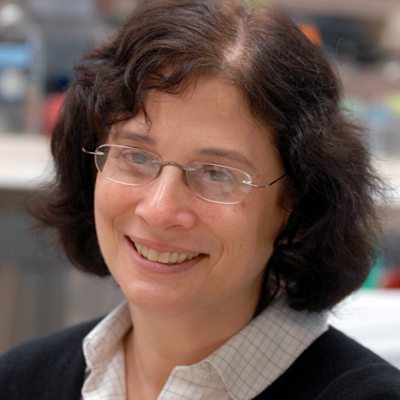Elucidating causes of autoimmune diseases and improving treatment for lupus and AIDS
“I locked myself away until I was confident and comfortable again,” were the words of former Disney celebrity Selena Gomez who was diagnosed with lupus in 2013 at the age of 21 [1]. According to the Lupus Foundation of America, most individuals diagnosed with the disease are women between the ages of 15-44 [2]. Meanwhile, all-time tennis star Venus Williams announced that she was struggling with Sjögren's syndrome, a related autoimmune disease that attacks exocrine glands like tear ducts. Patients with lupus and Sjögren's syndrome are attacked by their own immune systems which produce antibodies against the patients’ own cells, a problem for which there are treatments but no cure. Dr. Sandra Wolin, Professor of Cell Biology at Yale University, studies how cells recognize and remove unneeded RNA molecules and how failure to do so can affect cells and contribute to diseases like lupus and Sjögren's syndrome. An expert and pioneer in RNA biology, Dr. Wolin is making great strides in elucidating the mechanisms that lead to autoimmune disease and in identifying new targets to combat viruses like HIV.
Patients with autoimmune diseases such as lupus and Sjogren’s syndrome make antibodies against specific cellular RNA-protein and DNA-protein complexes. These antibodies and the complexes they recognize cause many of the symptoms of these diseases. It is often not clear which antibody complex contributes most to disease, but some antibodies are specifically associated with certain symptoms of lupus, and these antibodies target a protein called Ro60. A ring-shaped RNA-binding protein normally present in most cells of people and animals, Ro60 is a major target of the antibodies that are central features of Sjögren's syndrome and lupus. Women with antibodies to Ro60 are at risk of having babies with heart defects that can affect a child for the rest of its life. Dr. Wolin’s laboratory discovered that many bacteria contain a Ro60 protein. Because there is much evidence that antibodies to Ro60 proteins cause disease in patients, Dr. Wolin is collaborating with Dr. Martin Kriegel, a rheumatologist and immunologist at Yale University, to determine if these bacterial Ro60 proteins trigger autoimmunity in susceptible people. Elucidating why the antibodies originate will help in identifying new treatments for lupus and other autoimmune diseases.
Current research includes:
- Bacterial Ro60 Proteins: The very first antibodies that can be detected in people who will go on to develop lupus are against a part of the Ro60 protein that is also present in the bacterial Ro60 proteins. Since many bacteria with a Ro60 protein normally live in our skin and in our gut, Dr. Wolin and her team are studying if these bacterial Ro60 proteins trigger the initial autoantibody response. A breakthrough in this area would greatly impact treatment options.
- Cellular RNAs as Therapeutic Targets for Retroviruses: Retroviruses are a group of RNA viruses that insert a DNA copy of their genome into the host cell in order to replicate. The best known retrovirus is HIV-1, the virus that causes AIDs. Small and powerless otherwise, these viruses have to invade and feed off the cellular machinery inside the host cell in order to replicate. In a project separate from the Ro60 studies, Dr. Wolin and her team found that retroviruses package cellular RNAs from a new pathway in which cells get rid of unneeded RNAs. Currently, her team is determining how these cellular RNAs contribute to the lifecycle of retroviruses. They are also working to design “Trojan RNAs” that, after being taken up into the retrovirus, act to block virus replication. In this way, the lab hopes to improve treatments for AIDS.
Bio
Dr. Sandra Wolin is an established RNA biologist who has studied the biogenesis and function of RNA molecules for more than 30 years. She is Professor of Cell Biology and of Molecular Biophysics and Biochemistry at Yale School of Medicine, as well as the Director of the Yale Center for RNA Science and Medicine. She received both her Ph.D. and M.D. at Yale University in 1985.
Dr. Wolin’s interest in research dates from a class in advanced biology that she took during her senior year of high school. The class spent nearly half the year on genetics, focusing on a project in which students were given fruitflies with eye, wing and body color mutations. By crossing the flies to other fly stocks and scoring the progeny, the students had to determine which of several possible genes carried the mutations. Students had to take the flies home, along with a microscope and a can of ether, to anesthetize, observe, and mate them on their own time. Although some flies escaped, Dr. Wolin’s mother took it in stride. This experience of collecting her own data and using the results to figure out the answer to a puzzle was unbelievably exciting for Dr. Wolin, who was then hired as a Princeton freshman to maintain fruitfly stocks in the Department of Biology.
This beginning of her career led to summer jobs in the department, where she carried out small experiments on learning and memory in fruitflies. She eventually joined the adjacent Department of Biochemical Sciences, where she had the privilege of working in the laboratories of Marc Kirschner and Raju Kucherlapati, and also switched her organism to cultured mammalian cells. As in high school, Dr. Wolin found it thrilling to be able to design and carry out experiments and then to learn the results. She wanted to be a scientist. However, because she was unsure that she would ultimately be successful at research, and because her parents thought that medicine was a more stable career, she chose to enter a M.D.-Ph.D. program. Her Ph.D. work in the laboratory of Joan Steitz at Yale and her subsequent postdoctoral work with Peter Walter at the University of California San Francisco ultimately convinced her to follow her heart and become a scientist. Nonetheless, her experiences working with patients in medical school continues to inspire her to choose research problems that have direct medical relevance.
Outside of her research, Dr. Wolin enjoys gardening and spending time with her family.
For more information, visit http://medicine.yale.edu/lab/wolin/index.aspx
In the News
Yale School of Medicine
Yale School of Medicine
Yale School of Medicine


